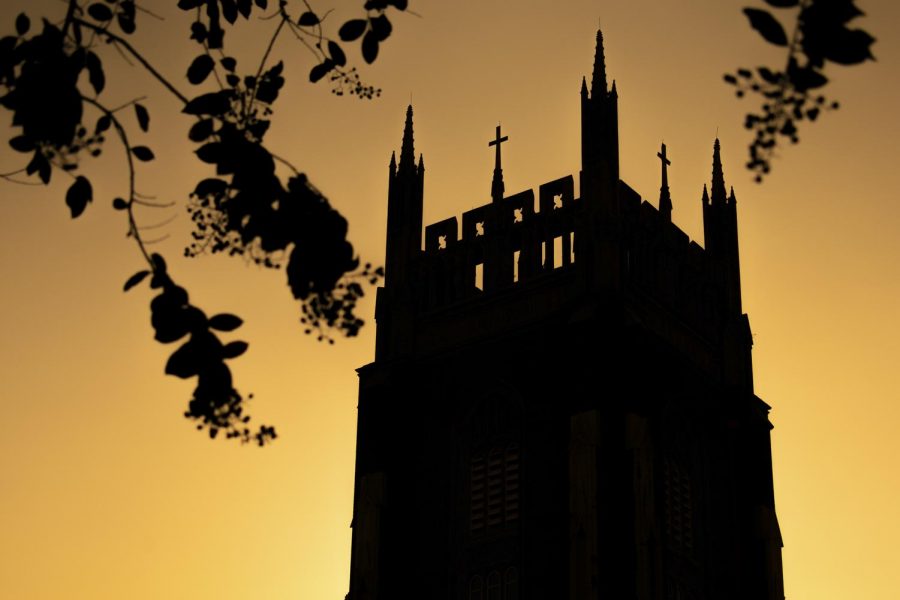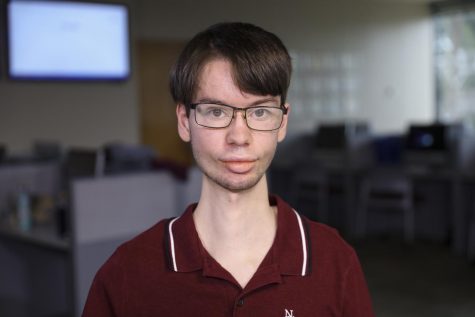Student-musicians struggle financially with masses cancelled
The sun sets on Holy Name of Jesus Church on Sept. 24, 2019. Due to the COVID-19 pandemic, churches all around New Orleans have shut their doors and cancelled mass, leaving student-musicians who play during the services out of work.
March 29, 2020
Due to the COVID-19 pandemic, sound and soul of New Orleans have had to take a back seat and Loyola University student-musicians who perform during mass have felt some of the hardest blows.
Nearly two weeks ago, the Roman Catholic Archdiocese of New Orleans and Archbishop Gregory Aymond informed the eight parishes in the Archdiocese that all masses and religious gatherings would be cancelled indefinitely. While the news shocked many, student-musicians who perform during these masses have not only lost their income, but also their form of expression.
“Come hell or high water, mass happens and apparently now that’s not the case,” said Allie Waguespack, a junior at Loyola who performs in the St. Louis Cathedral choir as a soprano.
Waguespack has been performing at mass since she was 16-years-old and she has never taken a week off, especially since singing at mass has recently become her primary source of income.
“It’s kind of debilitating. You know, you get so independent on your own and you’re like ‘Oh I have two jobs I’m doing good and making money’ and then it’s all taken away,” said Waguespack. “You lose your school and two jobs in one week and that’s kind of a lot to take.”
Waguespack isn’t the only Loyola student-musician feeling the strain of not being able to perform at mass anymore. Stephanie Guevara, a Loyola music education junior who sings at St. Francis of Assissi, said her job singing at mass allowed her to pay her rent and stay in New Orleans.
“It was the same pay every week and I knew that at the end of the month I was going to make a certain amount,” said Guevara.
Guevara even said that the day Loyola cancelled classes, her parents were in town to watch one of her recitals. The recital was cancelled and Guevara’s parents asked her if she wanted to come back to San Antonio but Guevara said she wanted to stay in New Orleans because she knew she would be making money singing at St. Francis. Once all masses were cancelled with no way to pay for rent, Guevara felt like she had no choice but to move back home to San Antonio.
“I started freaking out,” said Guevara. “(Not being able to perform at mass) was just very sad for me.”
Greg Fortier, a music industry senior at Loyola who plays piano at St. Catherine of Siena, also said that performing at mass used to be his primary source of income, but now he’s left waiting to see what the future will bring.
“It’s been rough because now I’ve gone into conservation mode on my money and I’m hoping that it’ll last me until this ends but if it doesn’t, I might have to find some new work,” said Fortier.
The hardest part about dealing with the pandemic, according to the musicians, has been not following the innate purpose of a musician— to perform.
Tony Domino, a Loyola junior who also sings at St. Louis Cathedral and the New Orleans Opera, said that he misses performing with other student-musicians.
“Music is my entire life basically and having that absence is just very weird to me,” said Domino. “I have this gap, this kind of hole that I can’t fill because I miss being around (musicians) all the time. There’s nothing I can compare that feeling to, being in that room and working with your fellow (musicians) towards a goal.”
Waguespack and Guevara also said that music is such a big part of who they are and that not being able to express that has been difficult.
“Music is me in my core and to have that be taken away… I can’t describe the grief that it is to feel that you’re not going to musically collaborate with someone for months on end,” said Waguespack.
“I feel like it was very eye-opening to see how much any musician relies on being able to just do music for others,” said Guevara. “I feel like as musicians, we love performing and sharing that with other people but once we don’t have that opportunity anymore it’s like ‘damn what do we do now?’”
Each of these student-musicians believes that it’s just a waiting game for the music scene to clear up again. Until then, they’ll have to not let the silence affect their morale like Domino said it already has.
“I wouldn’t say I have no purpose but then again that’s kind of what I’m saying because everything (musicians) have been working towards is no longer a thing,” said Domino.”It just doesn’t feel right to me.”








